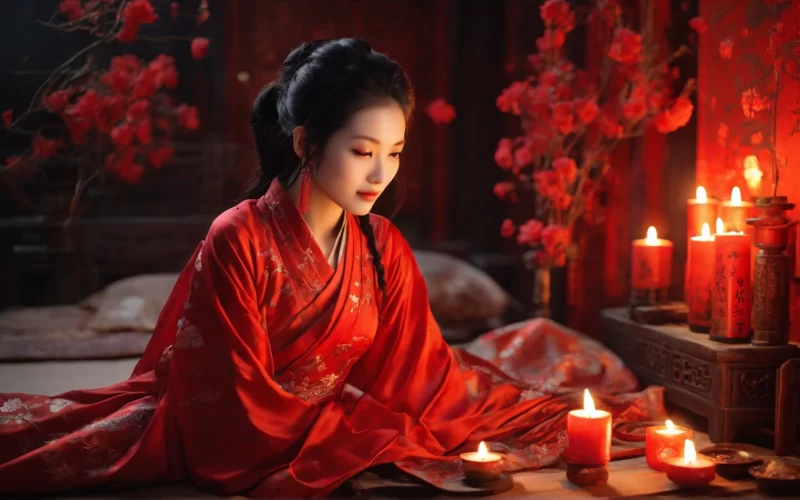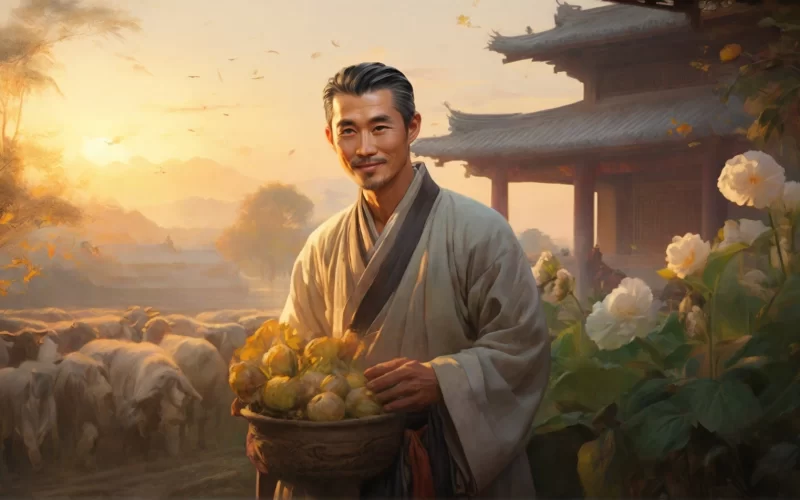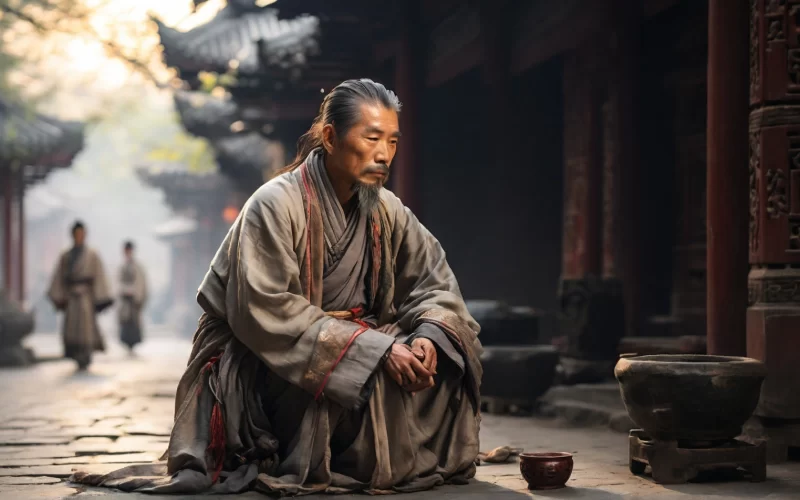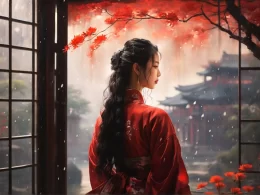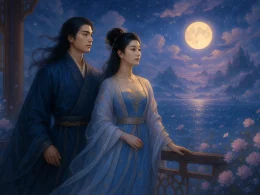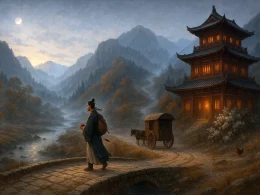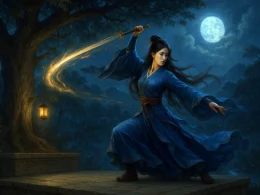Now that the palace-gate has softly closed on its £lowers,
Ladies file out to their pavilion of jade,
Abrim to the lips with imperial gossip
But not daring to breathe it with a parrot among them.
Original Poem
「近试上张籍水部」
洞房昨夜停红烛,待晓堂前拜舅姑。
妆罢低声问夫婿,画眉深浅入时无。
Interpretation
This poem was composed by Zhu Qingyu as a "presentation poem" (行卷诗) addressed to Zhang Ji, then Director of the Water Bureau, on the eve of Zhu's imperial examination. Under the Tang civil service system, candidates often submitted literary works to established scholars and officials—a practice called xingjuan—to seek recognition and recommendations. Zhang Ji, a renowned poet comparable to Han Yu and celebrated for mentoring talents, was precisely the figure Zhu hoped to impress for examination success. Notably, Zhu avoids direct references to the test or career ambitions. Instead, he ingeniously adopts the metaphor of a bride meeting her in-laws—a traditional wedding custom—to analogize his own nervous anticipation of facing the examiners. The poem's sincere emotion and unique conception demonstrate remarkable artistry.
First Couplet: "洞房昨夜停红烛,待晓堂前拜舅姑。"
Dòng fáng zuó yè tíng hóng zhú, dài xiǎo táng qián bài jiù gū.
Last night in the bridal chamber, red candles burned unwavering;
At dawn, she'll bow before her in-laws in the hall.
This couplet sets the scene like a muted yet evocative wedding tableau. The unextinguished candles symbolize marital continuity and ardor, while also hinting at the "last night's" tension and expectation. "At dawn" marks the impending pivotal moment, foreshadowing what follows.
Second Couplet: "妆罢低声问夫婿,画眉深浅入时无?"
Zhuāng bà dī shēng wèn fū xù, huà méi shēn qiǎn rù shí wú?
Makeup done, she whispers to her groom:
"Are my brows shaded fashionably—too light or too dark?"
Here, emotional nuance is rendered with exquisite delicacy. Facing the solemn occasion of meeting her in-laws, the bride's anxiety manifests in questioning even her makeup's appropriateness. The "whispered question" conveys not just shyness but reverence and caution toward the future. Zhu, casting himself as the bride, parallels his own position as an examinee facing the scrutiny of examiners (and Zhang Ji as the groom). The painted brows symbolize his poetic craft—his subtle inquiry about their "fashionability" actually probes whether his verses align with Zhang's and the examiners' tastes. This metaphorical brilliance exemplifies the bixing (比兴) technique at its most ingenious.
Holistic Appreciation
On the surface, this poem depicts a newlywed bride paying respects to her in-laws, yet every line serves as an allegory for the poet himself. Zhu Qingyu employs vivid domestic details—"crimson candles at night," "asking after her makeup"—to channel the anxiety, sensitivity, and hopeful uncertainty of a scholar awaiting imperial examination results through a tender, feminine lens. The line "Are my brows too light or dark for current fashion?" has resonated across centuries: while ostensibly about cosmetics, it mirrors the poet’s deeper fear—whether his writing aligns with contemporary taste and examiner expectations. The "depth" of the brows represents craft; their "fashionability" hinges on aesthetic timing. This single question encapsulates fate’s precariousness, showcasing Zhu’s mastery of psychological nuance and artistic subtlety.
Artistic Merits
- Innovative Allegory: The "bride meeting in-laws" trope becomes a brilliant metaphor for examination candidates, using feminine psychology to articulate masculine struggles—amplifying poetic tension.
- Exquisite Detail: Phrases like "asking softly" and "brows’ depth" reveal layered emotions—shyness, trepidation, meticulousness—crafting a fully realized character.
- Lyrical Elegance: The language is veiled yet fluid, each line hovering between reality and metaphor like a silk-draped court portrait, where emotion and imagery merge seamlessly.
- Layered Meaning: A wedding scene thinly veils the imperial examination process. Artistic pursuit and worldly anxiety unite here, achieving perfect harmony of scene and significance.
Insights
This poem proves how the smallest metaphors can bear grandest truths. Its gentle cadence belies scholars’ existential hopes and struggles during China’s examination era. Through a classical, domestic analogy, Zhu captures the universal tension between artistic integrity and conformity—how creators must perpetually gauge both craft and zeitgeist. Its restrained expression remains a literary paradigm, reminding us that even career pursuits can yield transcendent poetry when handled with such grace.
Poem translator
Kiang Kanghu
About the Poet
Zhu Qingyu (朱庆馀, dates unknown), a native of Shaoxing, Zhejiang, was a Mid-Tang dynasty poet who attained the jinshi degree in 826. A master of five-character regulated verse (wulü), his poetry is characterized by delicate restraint and lyrical subtlety—refining Zhang Ji's style with greater refinement. The critic Yan Yu praised him as "graceful yet profoundly evocative, a virtuoso of the Mid-Tang," positioning him as a transitional figure between the Dali and Yuanhe poetic eras.






